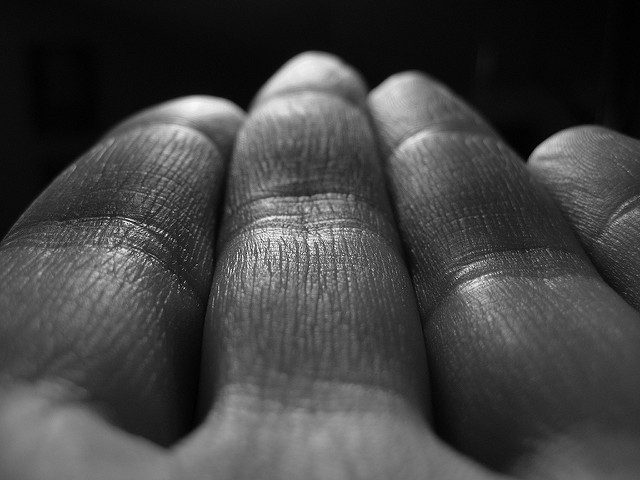Image Courtesy of Pedro Mendes. Shared via a Creative Commons license.
—-
The Grammatical Number
one finger two
finger three
fingers four and
with the fifth there
is a hand
from the hand
comes a human from
the human comes
the black one from the black
one comes a hand
from the hand
comes a finger and
another and
another and an-
other and another.
—-
Hunger (Motivational State)
1.
I become my mother and father. I don
their costumes, their postures. Posturing:
Where have they gone and how do I stop
them from eating me. The answer comes
unspoken but the gutter whimpers in the rain
on the side of the house in which I live
alone. I lock the door. I sleep with my
costumes on and my eyes open in case
the wind raps, wet and full of gutter-
sounds, in the middle of the night, looking
to bare my childbody.
2.
She does not come
to my closed door
tonight, the girl. I cry
her pygmy name for hours
from under cloaks. In her
absence, I devour her.
—-
Where O Where Is the Joy of Fear
——————-strange: for some reason fluff and feathers fly
——————————————————– Gennady Aygi
The bird is sometimes called
the sea-swallow. Several
feet in the air
off the coast
of North America, plunging: The sea-
swallows with small black mouths,
with small sharp mouths.
—-
Elegies for Living People, #2
After I had dug a trough on the surface of the ocean,
my friends, the sea-birds, remarked that it resembled
nothing less than God’s gullet.
I had not gone far
enough when I corralled the centaurs and charged
back toward Thessaly. That time, you did not see
or did not care, father. This time, I am more brilliant,
even more brilliant than you
had hoped I’d be. What was your dream.
I filled the trough with imaginary gold
trinkets that I had stolen from imaginary gold
temples on my wanderings in-between
imaginary homes. I filled the trough with your body,
which I had not known before but had dreamed it
to have twenty limbs, all blue and swelling, and calves
the size of women. What was my dream.
I lay my own self in it too and my friends————–the sea-birds
remarked that I had eyes like Jonah, before the whale.
Little did they know,
so little.
Did they know
for whom I had been digging? It is difficult to say your name,
father, because I do not know it. No one had ever told me
how many limbs you truly had.
It was only when I saw you—for the first time
———at the bottom of the ocean
that I understood that you were nothing
less than God’s child. Then I understood
why Thessaly had not moved you, and dug.
And performed the impossible and filled it with you.
—-
Anaïs Duplan is the author of a forthcoming collection of poems titled Take This Stallion (Brooklyn Arts Press, Spring 2016). Her poems and essays have appeared in Hyperallergic, Phantom Limb, [PANK], Birdfeast, and Dreginald, among others. She is a staff music writer for Decoder Magazine and No Fear of Pop as well as an MFA candidate at the Iowa Writers’ Workshop. Lastly, she acts as the founding curator of an international arts network called The Spacesuits, whose objective is to foster new works on the ethno- and Afro-future.
